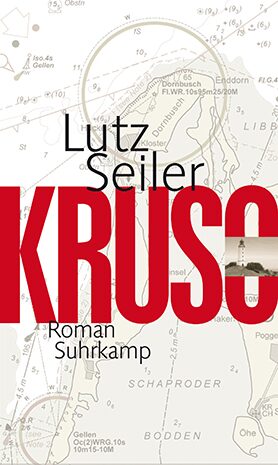Lutz Seiler
Kruso
[Kruso]
- Suhrkamp Verlag
- Berlin 2014
- ISBN 9783518424476
- 484 Pages
- Publisher’s contact details
Lutz Seiler
Kruso
[Kruso]
Sample translations
Robinson in Hiddensee: Lutz Seiler's novel “Kruso”
Seiler was raised in the GDR, and from the very start this socialization has provided the material for his literary explorations. His home town was razed in the process of mining for uranium, which is why he focuses on the phenomenon of radioactivity and uses it as an ambiguous metaphor in his early poems. It also plays a role in his first novel: The character Rommstedt, an X-ray researcher in the book, is thinly veiled as Robert Rompe, a physicist who had lived on the island Hiddensee, and who was the late Alyosha Rompe’s step-father (Alyosha is the legendary singer of the GDR punk band “Feeling B”).
The island Hiddensee used to be a clandestine meeting place for dropouts in the GDR, something akin to being at the very end of the world. And it is the setting of Seiler's novel which takes place at a precisely delineated time period: the final months of the GDR. Yet, it is not merely a novel about the GDR. The island Hiddensee and its concrete historical context are the backdrop for a linguistic excursion into the unknown, into the uncertain terrain of a different era and strata of experience.
The protagonist Ed Bengler escapes from Halle an der Saale, where he is working on a thesis about Georg Trakl, into the extraterritorial terrain of the island Hiddensee. He gets a job as a part-time dishwasher at the restaurant Klausner - one of the most sought-after places to work as a seasonal job for writers and scholars, who were either suspended or voluntarily dropped out. The GDR was the only country on earth where becoming a dish washer could be seen as climbing up the social ladder.
In his encounter with Kruso (the secret king of the island and head of the underground scene—his goal is to build a miniature secret counter-Republic on Hiddensee), Ed experiences a Bildungsroman in his own right. First and foremost this is a Robinson Crusoe story. Kruso, whose real name is Alexander Krusowitsch, is of Russian descent and his ideas about freedom make him something of a charismatic character. Ed is his “Friday,” a disciple, exactly as in Daniel Defoe's “Robinson” novel.
There is a dense network of lyrical references in this novel, which carry forth Seiler's preoccupation with poetry in a new way: the motif of the island, the Robinson motif, the motif of the restaurant “Klausner” that rises above the sea like a Noah's Ark. At the same time, “Kruso” also draws on existential investigations, coming-of-age and apprenticeship novels of the 18th century enlightenment, which started out as a search for meaning, and which during the romantic period took on unpredictable and suggestive forms. One can read also read “Kruso” as a fantastic adventure story, like Stevenson's “Treasure Island,” or “Moby Dick.”
The realistic strand—a milieu study of the non-conformist scene in the late GDR—is inextricably woven together with the strand that includes literary allusions and intertextual references. It is clear from his prose that Seiler is a poet. The relationship that develops between Ed and Kruso is driven by lines of poetry, and events are not primarily motivated psychologically but through imagery. The “amphibian,” left behind in the drain of the sink, in its black sensuality, is in homage to the author Wolfgang Hilbig, a Thuringian author who Seiler admires.
The novel can be read in many ways. Seiler explores the possibilities of individual freedom under social constraints, but above all it is a literary venture that skillfully blends the political and social with surreal and grotesque worlds, and this leads to a very unique aesthetic whole. A superb book that was crowned novel of the year 2014, but it is so much more than that.
► Lutz Seiler: A literary late-starter
Translated by Zaia Alexander

By Helmut Böttiger
Helmut Böttiger, born 1956 in Creglingen, studied German Literature and History. After serving for several years as Literary Editor of the Frankfurter Rundschau, he is now a freelance author, columnist and literary critic and lives in Berlin.
(Updated: 2020)
Publisher's Summary
An island of adventure and the story of an extraordinary friendship: Kruso, the first and long-awaited novel by Lutz Seiler, spans an arc from the summer of 1989 to the present day. The exceptional investigations that form the basis of the novel attempt to follow the traces of those who went missing in their escape attempts across the Baltic Sea, and in so doing, leads us all the way to Copenhagen and to the catacombs of the Danish state police.
After the accident, Edgar Bendler decides to step out of his own life. He becomes a dishwasher on Hiddensee, that legendary island which is said to lie outside of time and “beyond the headlines.” In the dishwashing station of the Hermit, a bar high above the sea, Ed meets Alexander Krusowitsch – Kruso—and a difficult, yet tender friendship begins. Kruso, master of ceremonies and godfather of the island, initiates Ed into the rituals of the seasonal workers on Hiddensee and the rules that govern their nights, conducting Ed toward his own sexual awakening. The secret heart of this confraternity is Kruso’s idea of utopia, which in just three nights promises to carry each and every one of the land’s (and life’s) shipwrecked souls to the roots of freedom. However, the events of the Autumn of 1989 do not fail to shake the island. A struggle between life and death ensues – and a promise.
(Text: Suhrkamp Verlag)
